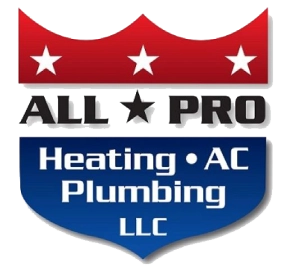
Have you noticed your heating system struggling this winter in Champaign, IL? With freezing temperatures and occasional snowstorms common in February, a malfunctioning heater can quickly make your home uncomfortable. Many homeowners wait until their furnace completely fails before calling for service, but this can lead to higher repair costs and even safety hazards. Knowing the warning signs of a system that needs attention can save you money, keep your family safe, and ensure your home stays warm all season long.
At All Pro Heating, AC, Plumbing, we understand how critical it is to keep your heating system running efficiently during the cold Champaign winters. Here are the top eight signs that your heating system needs maintenance right away.
1. Uneven Heating Throughout Your Home
Do some rooms feel colder than others, even when your thermostat is set to the same temperature? Uneven heating is a common sign that your system is struggling. This could indicate clogged air filters, blocked vents, or even issues with your ductwork.
A system working inefficiently has to work harder to maintain the desired temperature, which can increase energy costs. If you notice some rooms are always chilly while others are warm, it’s a clear signal that maintenance is needed.
What you can do:
-
Check and replace air filters regularly.
-
Inspect vents for obstructions like furniture or curtains.
-
Schedule a professional HVAC inspection to check your ducts and overall system performance.
2. Strange Noises Coming from Your Furnace
Has your furnace started making unusual sounds? Grinding, banging, rattling, or squealing noises are not normal. These sounds often indicate mechanical problems, such as worn-out belts, loose components, or failing motors.
Ignoring these noises can lead to a total system breakdown. A professional can pinpoint the source of the noise and perform the necessary repairs before a minor issue becomes a major one.
Tip: Keep a log of when you hear the sounds, as this can help the technician diagnose the problem more quickly.
3. Higher Than Usual Energy Bills
If your heating bills suddenly spike in the middle of winter, it may be more than just colder temperatures causing the increase. An inefficient heating system works harder to heat your home, consuming more energy in the process.
According to the U.S. Department of Energy, heating accounts for nearly 42% of the energy use in a typical American home. A well-maintained system runs efficiently, keeping your energy bills more predictable.
What to check:
-
Ensure your thermostat is working correctly.
-
Replace air filters to improve airflow.
-
Schedule a professional tune-up to optimize system efficiency.
4. Frequent Cycling On and Off
Does your heater turn on and off more frequently than usual? This is known as short cycling and can be caused by a variety of issues, including:
-
Thermostat malfunctions
-
Clogged air filters
-
Improperly sized heating system
-
Refrigerant or gas supply problems
Short cycling not only wastes energy but also increases wear and tear on your system, potentially shortening its lifespan. A professional can identify the root cause and prevent more serious damage.
5. Yellow or Flickering Pilot Light
For gas furnaces, the pilot light should burn a steady blue color. A yellow or flickering flame can indicate incomplete combustion, which may produce carbon monoxide, a colorless, odorless gas that is extremely dangerous.
If you notice this sign, it’s critical to call a professional immediately. They can safely inspect your furnace, make necessary repairs, and ensure your system is operating safely.
Safety tip: Install carbon monoxide detectors in your home if you haven’t already.
6. Strange Odors When the System is Running
A heating system should not emit unusual smells. Certain odors can be linked to specific issues:
-
Burning or electrical smell: Could indicate overheating components or electrical problems.
-
Musty or moldy smell: Could be a sign of mold in your ductwork or on your air filters.
-
Gas smell: Could indicate a gas leak, which requires immediate professional attention.
If you notice any of these odors, turn off your system and schedule a professional inspection right away.
7. Water Leaks or Moisture Around the Furnace
Any sign of water pooling near your heating system is a warning sign. Leaks can be caused by:
-
Condensation buildup
-
Malfunctioning humidifiers
-
Broken or blocked condensate drains
Moisture can lead to corrosion, mold growth, and even electrical issues. Addressing leaks promptly will protect both your system and your home’s structure.
Action step: Have a professional inspect your system and repair any leaks or blockages. Regular maintenance can also prevent this issue from occurring.
8. Your Furnace is Over 15 Years Old
Even if your system seems to be working fine, age is a factor. Furnaces typically last 15–20 years. As they age, they become less efficient, more prone to breakdowns, and more expensive to repair.
Replacing an older system before it fails can improve your home’s comfort and efficiency. Modern heating systems are more energy-efficient and can save you money on monthly energy bills while keeping your home warmer in the cold Champaign winters.
The Benefits of Regular Heating System Maintenance
Understanding these warning signs highlights why regular heating system maintenance is so important. Routine maintenance can:
-
Improve energy efficiency
-
Reduce repair costs
-
Extend the lifespan of your system
-
Ensure consistent comfort throughout your home
-
Keep your family safe from hazards like carbon monoxide
A maintenance visit typically includes cleaning and inspecting all major components, checking for leaks or blockages, and making minor adjustments to optimize performance. Many homeowners schedule annual maintenance in the fall to prepare their system for the winter months, but if you notice any of the above signs, it’s best not to wait.
For Heating System Maintenance in Champaign, IL, Contact All Pro Heating, AC, Plumbing Today
Winter in Champaign can be unpredictable, and a malfunctioning heating system can quickly turn a cozy home into an uncomfortable one. At All Pro Heating, AC, Plumbing, we are committed to keeping your home safe and warm all season long. Our experienced technicians can diagnose issues, perform thorough maintenance, and provide professional repairs when necessary.
Don’t wait for a small problem to become a costly emergency. Whether you’re noticing unusual noises, uneven heating, or your furnace is simply aging, we’re here to help. Contact All Pro Heating, AC, Plumbing today for expert heating system maintenance and enjoy a warm, worry-free winter.








